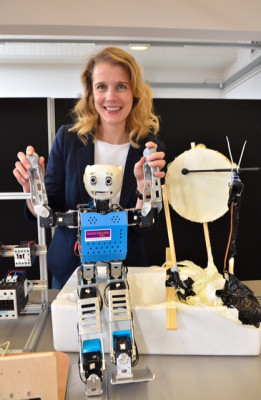Danielle George MBE, Professor of Microwave Communication Engineering at the University of Manchester, is starting a robotic revolution with a crowd-sourced robot orchestra.
I am on a mission… to form a robot orchestra, aided and abetted by hundreds of people all over the North West, who are busy right now building 50 different robots to join our band. Our first rehearsal is coming up on 24 June to help us get ready for the grand performance at the opening ceremony of the Euro Science Open Forum at Manchester Central on 24 July as part of the European City of Science celebrations.
We have all sorts of different kinds of robots, built from recycled electronics and junk from an eclectic mix of donors including the Women’s Institute, the National Trust and the Manchester Transport Network. Each group is making their own robot to play a particular part. The orchestra will consist of ‘electronic brains’ which create music by playing real instruments including violins, glockenspiels and xylophones, as well as redundant technology like floppy disk drives and old desk fans, which can make their own sounds.
This is the first Citizen Science project of its kind, reusing discarded machines and technology. It is a much more ambitious version of the pilot version that we assembled for my 2014 Royal Institution Christmas Lecture How to hack your home, which was broadcast on BBC Four. After its Manchester debut, we plan to take it on tour across the country, with the support of the Royal Academy of Engineering.
At our Hack Day a few weeks ago almost 200 primary and secondary school children came to the Great Hall at the University’s Sackville Street Building, where partner organisations and supporters such as Apple, The Hive, Noisy Toys and FabLab led workshops to build music-making robots. Around 20 robots were created, including a series of percussive devices such as a drum made from Pringles cardboard tubes, plus various tambourines and bells.

Our friends at the engineering company Siemens are building a special robot conductor to keep the other robots to time. It’s called ‘Graphene’, as it’s a good conductor! At the Hack Day, Adam Holmes from Siemens made a presentation to the children and teachers to show the engineering behind the robot and how it plans to keep all the other robots in time.
We are also working closely with the Hallé Orchestra, which is so exciting. Steve Pickett, Education Director at the Hallé, has composed a special piece of music for the orchestra launch and will provide eight professional musicians to perform live alongside the robots. Steve revealed the music at the Hack Day where we were all amazed and intrigued as to how we’ll get our robots to play such a wonderful piece of music!
Robotics is very topical right now, with the first UK Robotics Week currently underway (from 25 June) and the Science Museum preparing a fantastic new Robots exhibition for 2017. The robot orchestra will help us to showcase the ingenuity, creativity and revolutionary spirit of the people of Manchester, and enable us to explore how a city can re-engineer its old ‘stuff’ and spread environmentally responsible good practice through music and performance.
We want to showcase everyone’s work – from five-year-old primary school children working together to the 75-year-old tinkering in their garage – and to celebrate the fantastic failures that allow us to develop our skills and creativity. I’d love this project to get more people tinkering and making, and for them to think about where being involved in such a crazy project can take them. I also hope that it will make children realise that they don’t have to choose the arts OR science – they can do both – it’s called engineering! Everyone can discover the secret engineer inside themselves – and build an amazing machine from their imagination.
If people have lots of fun doing engineering then I’d also like them to recognise that they could use their skills to solve some of the big global challenges we all face. It’s my ambition that this project start some people on that journey.
On 23 June, Professor George was awarded the 2016 Royal Academy of Engineering Rooke Award for public promotion of engineering for her work. Named after industrialist and past Academy President Sir Denis Rooke FREng, the award recognises people who have brought engineering to life for the public.